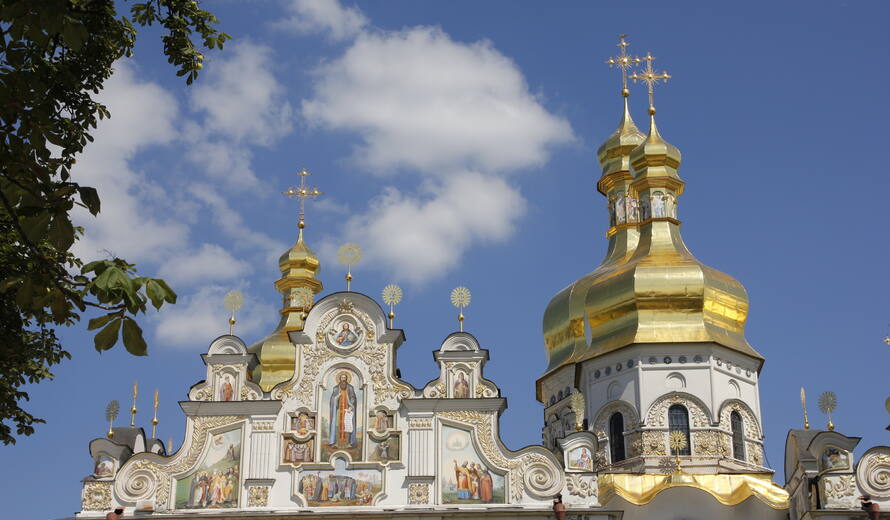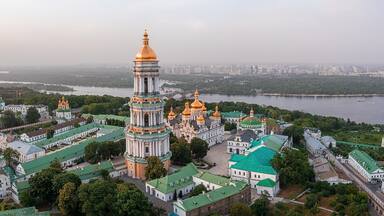Ukraine: Nearly 30 States pledge to support UNESCO's efforts in the recovery of the cultural sector
Gathered in Vilnius on Friday, at the initiative of Lithuania, nearly 30 States pledged to increase their support to the recovery of Ukraine’s cultural sector, through the coordination of UNESCO. A medium and long-term plan of action, drawn up by the Organization in consultation with over 40 international and Ukrainian institutions, will be implemented.
Vast needs remain to be met
On Thursday, the number of cultural sites for which UNESCO was able to verify damage passed the symbolic 400 mark. These include 191 buildings of historical and artistic interest, 137 religious sites, 31 museums, 25 monuments, 15 libraries and 1 archive. While the first consolidation and restoration projects have been launched in recent months through the coordination of UNESCO, notably in Kyiv and Odesa, the financial needs to pursue this work are immense - an updated UNESCO evaluation, published in February 2024, puts the cost at an average of $680 million per year until 2033.
In addition to the physical damage, a significant proportion of cultural and artistic activities have been halted, and many artists have been unable to create or work, leading to a sharp decline in their livelihoods. Since Ukraine cannot meet these needs alone, an increasing involvement from the international community is vital.
A joint action plan drawn up by UNESCO
In this respect, the commitment made by the States at the Vilnius Conference marks an important milestone, especially as it is accompanied by a concrete medium- and long-term plan, drawn up over the last few months by UNESCO in consultation with the Ukrainian authorities and over 40 national and international organizations.
This plan is composed of 6 areas of action: (1) Monitoring, assessing and documenting damage to cultural heritage; (2) Preventive and urgent measures, repairs, reconstruction and recovery of cultural heritage; (3) Revival of cultural institutions and cultural education; (4) Strengthening cultural and creative industries; (5) Strengthening resilience through culture; (6) Digital transformation of the cultural sector. It will help to prioritize interventions and ensure the effective coordination of international efforts.
UNESCO and the countries taking part in the Vilnius Conference have agreed to meet again on June 11 and 12 to work on the implementation of this action plan, during the Ukraine Recovery Conference scheduled to take place in Berlin (Germany).
Austria, Belgium, Bulgaria, Canada, Croatia, Czech Republic, Denmark, Finland, France, Estonia, Georgia, Germany, Greece, Iceland, Ireland, Italy, Japan, Latvia, Lithuania, Netherlands, Norway, Poland, Romania, Slovakia, Spain, Sweden, Switzerland, United Kingdom, United States.
Called for by Volodymyr Zelensky, President of Ukraine, during his meeting with Audrey Azoulay, Director-General of UNESCO, the International Conference for the Recovery of the Cultural Sector of Ukraine, held today in Vilnius (Lithuania), has resulted in a joint commitment by nearly 30 States from North America, Asia and Europe[1] to increase their support for artists and cultural professionals in Ukraine, protect and restore sites, and revive cultural life through the coordination of UNESCO.
There can be no healing of the wounds of war without culture. There can be no sustainable growth and prosperity without culture. This has been the purpose of UNESCO's work in Ukraine since February 2022. This is why the commitment made today by nearly thirty of our Member States will go down in history.
Vast needs remain to be met
On Thursday, the number of cultural sites for which UNESCO was able to verify damage passed the symbolic 400 mark. These include 191 buildings of historical and artistic interest, 137 religious sites, 31 museums, 25 monuments, 15 libraries and 1 archive. While the first consolidation and restoration projects have been launched in recent months through the coordination of UNESCO, notably in Kyiv and Odesa, the financial needs to pursue this work are immense - an updated UNESCO evaluation, published in February 2024, puts the cost at an average of $680 million per year until 2033.
In addition to the physical damage, a significant proportion of cultural and artistic activities have been halted, and many artists have been unable to create or work, leading to a sharp decline in their livelihoods. Since Ukraine cannot meet these needs alone, an increasing involvement from the international community is vital.
A joint action plan drawn up by UNESCO
In this respect, the commitment made by the States at the Vilnius Conference marks an important milestone, especially as it is accompanied by a concrete medium- and long-term plan, drawn up over the last few months by UNESCO in consultation with the Ukrainian authorities and over 40 national and international organizations.
This plan is composed of 6 areas of action: (1) Monitoring, assessing and documenting damage to cultural heritage; (2) Preventive and urgent measures, repairs, reconstruction and recovery of cultural heritage; (3) Revival of cultural institutions and cultural education; (4) Strengthening cultural and creative industries; (5) Strengthening resilience through culture; (6) Digital transformation of the cultural sector. It will help to prioritize interventions and ensure the effective coordination of international efforts.
UNESCO and the countries taking part in the Vilnius Conference have agreed to meet again on June 11 and 12 to work on the implementation of this action plan, during the Ukraine Recovery Conference scheduled to take place in Berlin (Germany).
Austria, Belgium, Bulgaria, Canada, Croatia, Czech Republic, Denmark, Finland, France, Estonia, Georgia, Germany, Greece, Iceland, Ireland, Italy, Japan, Latvia, Lithuania, Netherlands, Norway, Poland, Romania, Slovakia, Spain, Sweden, Switzerland, United Kingdom, United States.
Friday, 7 June 2024
at 15:00
2 min read
States Parties 31





